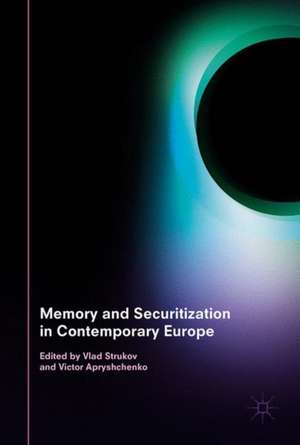Memory and Securitization in Contemporary Europe
Editat de Vlad Strukov, Victor Apryshchenkoen Limba Engleză Hardback – feb 2018
| Toate formatele și edițiile | Preț | Express |
|---|---|---|
| Paperback (1) | 638.57 lei 6-8 săpt. | |
| Palgrave Macmillan UK – 7 iun 2019 | 638.57 lei 6-8 săpt. | |
| Hardback (1) | 893.53 lei 6-8 săpt. | |
| Palgrave Macmillan UK – feb 2018 | 893.53 lei 6-8 săpt. |
Preț: 893.53 lei
Preț vechi: 1089.67 lei
-18% Nou
Puncte Express: 1340
Preț estimativ în valută:
170.100€ • 177.87$ • 141.17£
170.100€ • 177.87$ • 141.17£
Carte tipărită la comandă
Livrare economică 15-29 aprilie
Preluare comenzi: 021 569.72.76
Specificații
ISBN-13: 9781349952687
ISBN-10: 1349952680
Pagini: 284
Ilustrații: XIX, 284 p. 28 illus. in color.
Dimensiuni: 148 x 210 mm
Greutate: 0.52 kg
Ediția:1st ed. 2018
Editura: Palgrave Macmillan UK
Colecția Palgrave Macmillan
Locul publicării:London, United Kingdom
ISBN-10: 1349952680
Pagini: 284
Ilustrații: XIX, 284 p. 28 illus. in color.
Dimensiuni: 148 x 210 mm
Greutate: 0.52 kg
Ediția:1st ed. 2018
Editura: Palgrave Macmillan UK
Colecția Palgrave Macmillan
Locul publicării:London, United Kingdom
Cuprins
Chapter 1: Games of Memory, or Games with Memories: Imperial Past in the three Referenda (Victor Apryshchenko).- Chapter 2: Security, Memory and the Debate on Scottish Independence (Ewen Cameron, University of Edinburgh).- Chapter 3: Traumatic Memory: The De-securitization of Belfast (Paul Antick, University of Roehampton).- Chapter 4: Recurring Memories, Societies of Risk and Maps of Culture: Europe on Global Screen (Vlad Strukov).- Chapter 5: Media Genre, Disrupted Memory and the Securitisation Chronotope: The Case of the Lee Rigby Murder (Stephen Hutchings & Kenzie Burchell, University of Manchester).- Chapter 6: New Media, World-War-II Memory, and Securitisation in the Ukrainian Crisis (Mykola Makhortykh, University of Amsterdam).- Chapter 7: Security Risks and Coping Strategies of Western Businesses in Neo-patrimonial States: Evidence from Ukraine under Janukovytch (Hannes Meissner, City of Vienna Competence Team Black Sea Region/).- Chapter 8: Liquid Uncertainties in Europe: Economic Securitization and Beyond (Oliver Hinkelbein,University of Bremen).- Chapter 9: The Economy of Memory and Risks: Discourse Analysis of the European and Eurasian Economic Unions (the Case of Armenia) (Oxana Karnaukhova, Southern Federal University).- Chapter 10: Ecologies of Memory: Securitising Transnational Climate Change Risks through Memory Discoursein Russian and British Media (Marianna Poberezhskaya, University of East Anglia).
Recenzii
“It provides a useful framework for understanding some of the security mechanisms for those students who are interested in broadening their understanding on the subject.” (Priya Sara Mathews, Interdisciplinary Political Studies, Issue 6, July, 2020)
Notă biografică
Vlad Strukov is an Associate Professor in Film and Digital Cultures, University of Leeds, UK. He specialises in world cinemas, digital media and cultural theory. He is the author of ‘Contemporary Russian Cinema: Symbols of a New Era’ (2016) and other books on visual culture. He is the founder of Studies in Russian, Eurasian and Central European New Media.
Victor Apryshchenko is a Professor of History at the Southern Federal University, Rostov-na-Donu, Russia. His research focuses on construction and transformation of European identities and historical memory management in Europe. He is the author of monographs and articles on historical and social memory and European intellectual culture. He is the editor-in-chief of The New Past/Novoe Proshloe journal.
Victor Apryshchenko is a Professor of History at the Southern Federal University, Rostov-na-Donu, Russia. His research focuses on construction and transformation of European identities and historical memory management in Europe. He is the author of monographs and articles on historical and social memory and European intellectual culture. He is the editor-in-chief of The New Past/Novoe Proshloe journal.
Textul de pe ultima copertă
The volume is the first study to explore the intersection of memory and securitisation in the European context. By analysing a variety of practices ranging from film to art and new media, the book expands the existing theoretical framework of securitisation. The authors consider memory as a precondition for contemporary integration projects such as the European Union, and also showcase how memory is used to stage international conflicts. Following this memory-securitisation nexus, the European Union, and Europe more generally, emerges as an on-going cultural, political and social project. The book also examines developments outside the EU such as the conflict in Ukraine and the creation of the Eurasian Economic Union, which, the authors argues, have a profound impact on Europe. From a consideration of historical contexts such as national referenda the discussion proceeds to media and film analysis, artistic practice and more transient phenomena such as climate change.
Caracteristici
First study to consider simultaneously the issues of memory and securitization Offers a fresh perspective on the political, social and cultural developments in contemporary Europe Combines theory with empirical study
